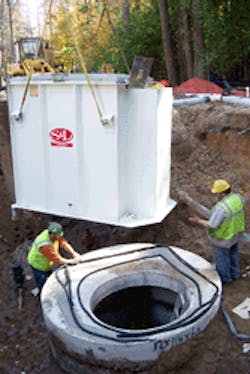Progressive City Gets a Pump Station Upgrade
In the 1800s, the city of Peshtigo, Wis., distinguished itself as a busy center for manufactured wood products in the heart of a burgeoning timbering region. However, on the fateful night of Oct. 8, 1871, the largest recorded forest fire in U.S. history ravaged northeast Wisconsin, blazing its way through Peshtigo in devastating fashion.
In a twist of irony, the “Great Peshtigo Fire” actually occurred on the same night as the well-known “Great Chicago Fire”, though the events were unrelated. Despite less national and historical notoriety, the Peshtigo tragedy resulted in five times more fatalities than in Chicago and covered more than 2,400 sq miles. It would be 32 years before Peshtigo would officially reincorporate as a city, but Peshtigo rose from the ashes through the determination of the surviving villagers.
In need of a change
In the summer of 2006, Cota together with his consulting engineer, Don Heikkila, P.E., of Kaempfer & Associates, teamed up to plan the replacement of an aging underground pump station that was not meeting capacity. New pumping conditions called for a duplex pumping arrangement to handle 360 gpm at 63 ft TDH.
Coinciding with a new launch by Smith & Loveless, they specified the next generation recessed station design, the R2 Wet Well Mounted Pump Station , complete with Sonic Start prime sensing. R2 means Rectangular X Recessed, and this station shell combination equates to 50% more effective workspace for operators and a compact and safe environment.
Being slightly recessed in the ground yet still with grade level access, the pump station maintains a low profile while benefiting from earth insulation for the colder Wisconsin climate and the ability to service deeper wet wells. Because the station is situated above the wet well and not lower in the earth like conventional dry-pt designs or submersible pump stations, excavation costs are lessened and access to all station equipment and controls is immediate.
Another key feature of the Peshtigo station design is the standard arrangement of all station equipment and accessories. The duplex pumps and controls reside at opposite ends of the station for safety and convenience, allowing internal control clearances to meet or exceed N.E.C. requirements. Accessories can be easily added in assigned spaces inside the station. Interior shelves allow storage of O&M manuals and tools.
The keys to success
The cornerstone of the S&L Wet Well Mounted Station concept is the low cost of ownership throughout the life of the pump station. This fact stems from several important attributes. Durable, high-efficiency pumps, both in terms of motor and pumping efficiencies, draw less power than alternate pumping schemes, while the S&L Pump vertical pump construction design promotes a typical service life of 25+ years and easy routine maintenance.
Adding to the success are exclusive Smith & Loveless traits like oversized stainless steel pump shafts (with minimum overhang), oversized bearings, bronze seal housing, premium efficiency motors with Class F insulation, and trimmed impellers inside the shrouds.
Additionally, removing the entire rotating assembly is simplified. By removing eight capscrews connecting the motor adapter to the volute the user gains full access to the volute and suction elbow. This gives the Village of Peshtigo the ability to perform virtually all pump maintenance and repairs onsite—if desired—without the use of outside contractors or expensive pump maintenance centers.
The robust pump construction and ease of maintenance contributes to capital and O&M costs remaining low throughout the long expected service life of the station. This saves on costs generated from materials, in-house labor, and outside contractor labor. Thousands of dollars are saved per individual pump station per year.
Don Voigt is a senior applications engineer for Energenecs Inc. He can be reached at [email protected].
Darby Ritter is the marketing communications manager for Smith & Loveless, Inc. He can be reached at 913/888-5201, ext. 494 or by e-mail at [email protected].
